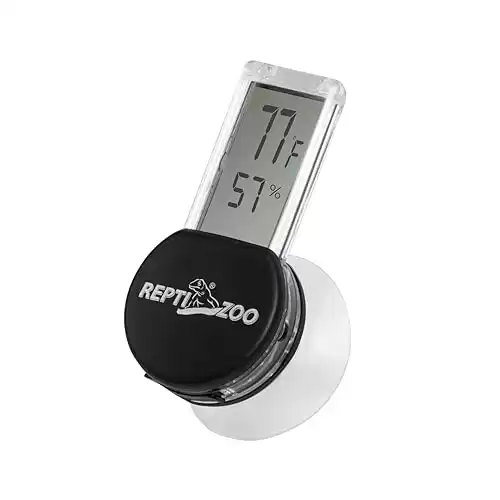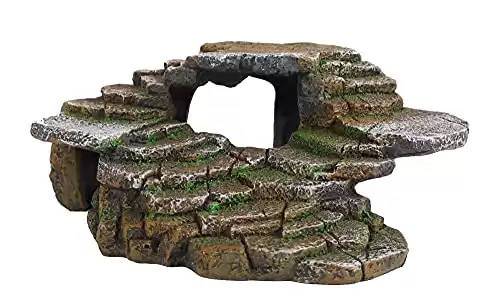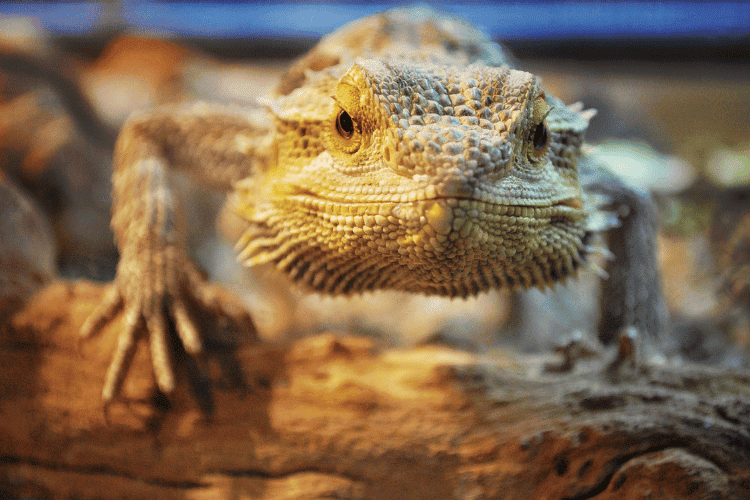
Ever wondered wondered why your bearded dragon’s rubbing their face on the ground?
Bearded dragons are fascinating creatures, and they can make wonderful pets. However, like any other animal, they can sometimes exhibit strange behaviors. One such behavior is rubbing their faces on the ground.
There are a few reasons why a bearded dragon might do this. In some cases, it’s normal behavior that is associated with shedding. However, in other cases, it can be a sign of stress or illness.
In this article, we’ll discuss the different reasons why bearded dragons rub their faces on the ground, how to tell if the behavior is normal, and what to do if it’s not. We’ll also provide some tips on how to prevent your bearded dragon from rubbing its face on the ground.
Let’s get started!
Why Do Bearded Dragons Rub Their Faces on the Ground?
Bearded dragons are known for their unique behaviors, and one of the most common is rubbing their faces on the ground. This behavior can have a few different causes, but it’s most commonly associated with pre-shedding.
When a bearded dragon is about to shed, its old skin will start to loosen. This is a natural process, but it can be a bit uncomfortable for the dragon, so it may rub its face on the ground to help loosen the skin and make it easier to shed.
How is the Ground Rub a Pre-Shed Ritual?
The ground rub is a behavior that some bearded dragons exhibit in the days leading up to and after they shed. It is thought to be a way for them to help loosen their old skin and make it easier to shed. It’s a common issue among most reptiles.
This rub helps to loosen the old skin by creating friction between the dragon’s face and the ground. The friction helps to break down the bonds between the old skin and the new skin, making it easier for the dragon to shed.
Interestingly, the ground rub isn’t a universal behavior among bearded dragons. Some dragons will never rub their faces on the ground, while others will do it every time they shed.
If you notice your bearded dragon rubbing its face on the ground, it is a good sign that it’s about to shed. You can help your dragon by offering it plenty of water.
Here are some other tips for bearded dragon owners to help your pet lizard shed:
- Increase the humidity in the tank. This can be done by misting the tank regularly or by using a
humidifier . Use a humidity gauge to keep track of the humidity levels. - Offer your dragon a shallow dish of water and a warm bath to soak in.
- Avoid handling your dragon during the shedding process.
Other Reasons Why Bearded Dragons Rub Their Faces on the Ground
In addition to pre-shedding, there are a few other reasons why a bearded dragon might rub its face on the ground. These include the following.
Stress
If a bearded dragon is stressed, it may rub its face on the ground as a way to relieve stress. This is often seen in bearded dragons that are kept in poor conditions or that are not getting enough attention.
Stress can be caused by a number of factors, such as:
- Poor living conditions, such as a tank that’s too small or that does not have the right temperature or humidity.
- Not getting enough attention from their owners.
- Being handled too much or too roughly.
- Being around other animals that are stressed or exhibit aggressive behaviors.
If a bearded dragon is stressed, it may also show other signs of anxiety, such as:
- Loss of appetite.
- Lethargy.
- Hiding.
- Biting.
- Tail bobbing.
- Getting a black beard.
Boredom
A bored bearded dragon might rub its face on the ground as a way to entertain itself. This is a common bearded dragon behavior when these pet reptiles do not have enough enrichment in their environment.
Enrichment is anything that helps to keep a bearded dragon entertained and stimulated. This can include things like:
- Toys, such as balls, logs, and hides.
- Variety in their diet.
- Opportunities to bask in the sun.
- Opportunities to climb and explore.
If a bearded dragon is bored, it may also show other signs of boredom, such as:
- Pacing.
- Biting at the bars of their tank.
- Not eating.
- Sleeping more than usual.
Health Problems
In rare cases, a bearded dragon may rub its face on the ground as a sign of some health issues. This could be a sign of a respiratory infection, parasites, eye infections, or another underlying medical condition.
If a bearded dragon is showing other signs of illness, such as:
- Lack of appetite.
- Lethargy.
- Weight loss.
- Diarrhea.
- Coughing.
- Wheezing.
It’s important to take your bearded dragon to the reptile vet to rule out any medical problems or bearded dragon diseases.
How to Tell if Your Bearded Dragon’s Ground Rub Is Normal
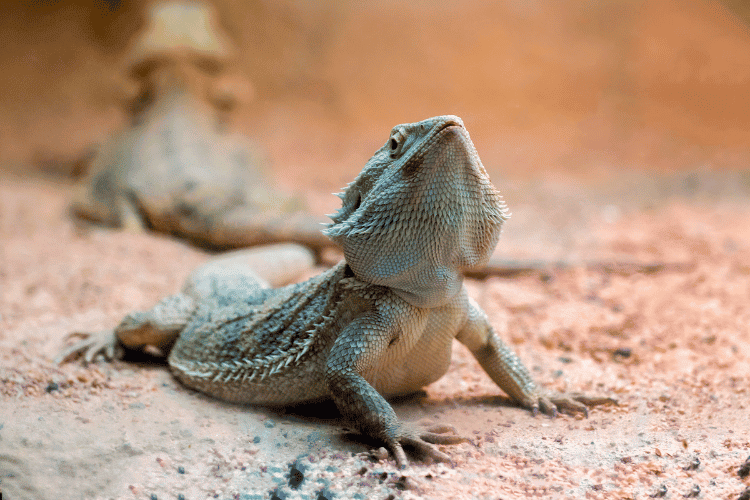
If you notice your bearded dragon rubbing its face on the ground, there are a few things you can look for to determine if it is a natural behavior.
The Frequency of the Ground Rub
If your bearded dragon only rubs its face on the ground occasionally, it’s likely normal behavior. However, if your bearded dragon is rubbing its face on the ground frequently or obsessively, it may be a sign of a problem.
A normal ground rub will typically only happen for a few days before and after the bearded dragon sheds. If the ground rub is happening more often than this, or if it is happening for longer periods of time, it may be a sign of a problem.
The Location of the Ground Rub
If your bearded dragon is rubbing its face on the ground in a specific location, such as a corner of the tank or under a rock, it is likely normal behavior. However, if your bearded dragon is rubbing its face on the ground all over the tank, it may be a sign of a problem.
A normal ground rub will typically happen in one specific location, such as the corner of the tank or under a rock. If the ground rub is happening all over the tank, it may be a sign of stress or boredom.
Check from time to time to see how this situation develops.
The Appearance of the Bearded Dragon
If your bearded dragon is not showing any other signs of stress or illness, such as loss of appetite or lethargy, it is likely that the ground rub is normal behavior.
However, if your bearded dragon is showing other signs of stress or illness, it’s important to take it to the vet to rule out a medical problem.
What to Do If Your Bearded Dragon’s Ground Rub Is Not Normal
If you’re concerned that your bearded dragon’s ground rub is not normal, there are a few things you can do.
1. Observe your bearded dragon
The first thing you should do is observe your bearded dragon to see if there are any other signs of stress or illness. If you notice any other signs, it’s important to take your bearded dragon to the vet.
2. Check your bearded dragon’s environment
Make sure your bearded dragon’s environment is appropriate for its needs.
This includes providing the right temperature, humidity, and correct lighting. A
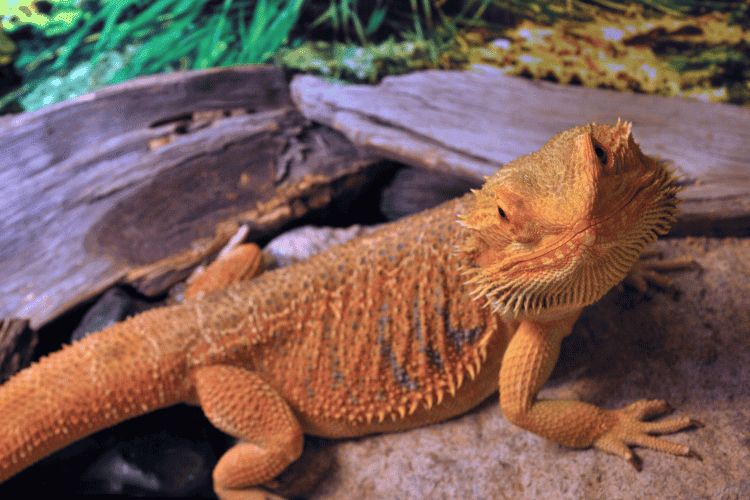
You should also make sure there is plenty of enrichment in the tank to keep your bearded dragon entertained.
3. Provide a humid hide
A humid hide is a small, enclosed space that is filled with damp moss or paper towels. This can help to keep your bearded dragon’s skin moist and make it easier to shed.
4. Offer a variety of foods
A varied diet will help to keep your bearded dragon healthy and prevent boredom. Offer your bearded dragon a variety of insects, vegetables, and fruits.
5. Provide plenty of enrichment
Enrichment is anything that helps to keep your bearded dragon entertained and stimulated. This can include things like toys, branches, and rocks to climb on.
6. Be patient
It may take some time for your bearded dragon to adjust to its new environment and stop rubbing its face on the ground. Be patient and consistent with your care, and your bearded dragon will eventually be happy and healthy.
7. Handle your bearded dragon gently and regularly
This will help to build trust and reduce stress.
8. Clean the tank regularly
This will help to keep your bearded dragon healthy and prevent the spread of disease.
9. Take your bearded dragon to the vet
If you’re still concerned after observing your bearded dragon and making sure its environment is appropriate, you should take it to the vet. The vet will be able to rule out any medical problems and give you advice on how to manage the ground rub.
You could also take your bearded dragon for regular vetinary checkups so that any problems are caught early.
With proper care, your bearded dragon can live a long and healthy life.
Conclusion
If you notice your bearded dragon rubbing its face on the ground, don’t panic. Observe them first so you know what their natural habits and behaviours are.
If you’re concerned that the ground rub is not normal, you should observe your bearded dragon for other signs of stress or illness and make sure its environment is appropriate. If you’re still concerned, you should take your bearded dragon to the vet.

